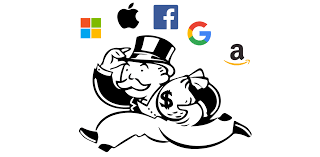Data Monopoly
Data monopoly is when a single company or entity controls a significant portion of a specific type of data or data market. This can happen in a number of ways, such as through acquisitions of smaller companies, exclusive partnerships or agreements, or simply by having a large and dominant market share. In a data monopoly, the company or entity in control significantly influences market prices, terms of service, and data access. This can lead to reduced competition, innovation, and potential privacy concerns. Additionally, a data monopoly can make it difficult for other companies to enter the market, which can stifle economic growth.[1] Big Tech companies have used their unchecked access to private personal information to create in-depth profiles about nearly all Americans and to protect their market position against competition from startups. Data monopoly can be a concern in many areas, including data-driven industries such as advertising, finance, healthcare, and transportation. The antitrust laws of many countries are in place to prevent such monopolies.
Contents
History
The concept of data monopoly was introduced by TODO.
The Monopoly of Attention
Mechanics under the attention marketplace
We pay for goods and services in the fiscal marketplace with legitimate currencies, while in the attention marketplace, we pay with our attention. The key performance indicators (KPIs) of attention-based companies often include the following core metrics: monthly active users (MAUs), time on site, and a handful of engagement metrics unique to the platform—likes, shares, views, comments, etc. These metrics are then used to evaluate the amount of attention paid to a platform. For example, more MAUs (people using the site) means there are more eyeballs to engage potentially. Time on site tells companies how long those MAUs are paying attention to their website or app—although more time on site could mean someone left their tab open. More MAUs spending more time on site means multiple factors of more attention paid. From there, other engagement metrics (clicks, swipes, shares, comments, etc) can be used to define the most common activities, which ones lead to more engagement, how and why, etc.
Nature of attention economy
Although referred to as the "attention economy," companies are not primarily seeking attention, but rather data.[2] This is why they are defensive about being labeled as addictive services. While they may not intend to harm society or create addictions, when users pay attention, their engagement on the platform results in valuable data. Data is now considered one of the most valuable assets in the world due to its non-rivalrous nature, meaning it can be replicated for free with little to no loss in quality and used simultaneously by an infinite number of people, which is a departure from traditional rivalrous goods. Rivalrous goods, such as books, cars, or oil, can only be used by one person or entity at a time. Photocopying a book, for example, takes time and money, and the copy may deteriorate over time. This is a limitation of rivalrous goods. In contrast, data does not have this limitation. Data can be utilized in various ways, such as conducting research, developing products, training AI and ML systems, and through data brokering operations or targeted advertising, all resulting in financial gain. Additionally, one set of data can be used by multiple companies, creating a network effect where all parties become increasingly reliant on the original source.
Network effect
The value of all these product
Instances
the Cambridge Analytica scandal
Ethical Concerns
Privacy, transparency and competition
When a small number of companies or organizations control a large amount of data, they have significant power and influence over the marketplace and society as a whole. This can lead to a lack of privacy for individuals, as their personal data is controlled by a small group of entities. Additionally, there may be a lack of transparency in how data is collected, used, and shared, making it difficult for individuals to understand and control how their personal information is used. Furthermore, data monopoly can also limit competition, as smaller companies and startups may not have access to the same data resources, making it harder for them to innovate and compete.
References
- ↑ Richard Blumenthal (2021). Letter to FTC chair Lina Khan. Retrieved from https://www.blumenthal.senate.gov/imo/media/doc/2021.09.20%20-%20FTC%20-%20Privacy%20Rulemaking.pdf
- ↑ Michael H. Goldhaber. The Attention Economy and Net https://firstmonday.org/article/view/519/440
